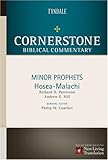 This is the most recent addition to the Bible Speaks Today series, which is slowly approaching completion, filling in the few remaining gaps in the Old Testament. Bridger’s task is to cover three of the least well known of the minor prophets, whose short books are largely dominated by pronouncements of judgment.
This is the most recent addition to the Bible Speaks Today series, which is slowly approaching completion, filling in the few remaining gaps in the Old Testament. Bridger’s task is to cover three of the least well known of the minor prophets, whose short books are largely dominated by pronouncements of judgment.
The first thing that stands out is the length. Bridger has written over 300 pages on just 7 chapters of prophecy. This is both a strength and a weakness. It allows him plenty of space to highlight New Testament parallels and explore various areas for application. But at the same time I wonder whether it makes this less accessible than other BST volumes – this is longer than the commentaries on Isaiah and Jeremiah.
In the introduction, Bridger is keen to underscore the contemporary relevance of these books, by reminding us that all Scripture is God’s word to us. These books teach us the importance of facing up to sin and judgement and the importance of responding in repentance and faith.
Obadiah is divided into three sections – the sovereignty of God, the judgments of God and the triumph of God. Bridger has an interest in applying his teaching not just to individual Christians or churches, but also to the political arena and society in general. This is particularly true in the comments on Nahum, which he says has a particular message to super-powers. He tackles themes such as the legitimacy of war, climate change, and self-indulgent addiction to alcohol, sex and money. In his commentary on Zephaniah he draws several parallels between Baalism and the failings of our own society. Bridger writes from a British perspective, and illustrates his points with various recent events from the UK.
Although the general outlook of each of the three books is one of judgment, Bridger reminds us that the justice of God is a positive thing, and that a message of judgment is an implicit call to repentance. The day of the Lord is not just a day of destruction but also a day of deliverance. He defends the unity of Zephaniah against those who claim 3:9-20 is a later addition, and brings out an interesting alternative interpretation of the one well-known verse in these books (Zeph 3:17), in which he suggests that it may be God, rather than us, who is silent – he delights in us not just by singing, but by looking on in silence like a mother with her baby.
Overall, this is a thorough and solidly evangelical commentary on these three books. This shines through in the way Bridger makes several connections to other parts of Scripture, and New Testament teaching in particular. He demonstrates how these books point forward to Christ. The fact that the tone of the biblical material he covers is more gloomy than cheerful makes this a fairly sobering read in places, and by drawing out warnings for believers and the church Bridger himself takes on the mantle of a modern day prophet, calling God’s people and society as a whole to repentance.

